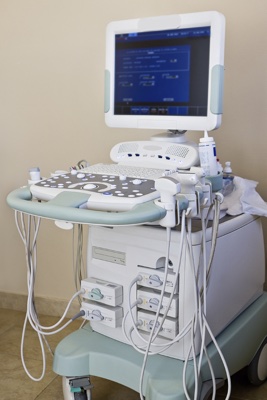UROGYN Savannah offers in-office ultrasound and all of our ultrasound technologists are registered diagnostic sonographers (RDMS) as well as certified by the American Registry of Radiologic Technologists (ARRT).
ABOUT ULTRASOUND
Ultrasound is energy in the form of sound waves. There is no radiation involved. The sound waves are directed into a specific area of the body through a transducer. The sound waves hit tissues, body fluids, and bones. Waves then bounce back, like echoes, and are converted into pictures of the internal organs. The images appear on a screen similar to a television. Dark areas show liquid; gray or light areas show denser material, like tissue or bone.

In women, an ultrasound is most often performed to evaluate the:
- bladder
- ovaries
- uterus
- cervix
- fallopian tubes
Ultrasound examinations can help diagnose symptoms experienced by women such as:
- pelvic pain
- abnormal bleeding
- postmenopausal bleeding
and help identify:
- palpable masses such as ovarian cysts and uterine fibroids
- ovarian or uterine cancers
- check location and position of IUDs
What will I experience during and after the procedure?
Most ultrasound examinations are painless, fast, and easy.
What are the benefits vs. risks?
Benefits:
- Most ultrasound scanning is noninvasive (no needles or injections) and painless.
- Ultrasound imaging uses no ionizing radiation.
- Ultrasound scanning provides a clear picture of soft tissues that do not show up well on x-ray.
- Ultrasound causes no health problems and may be repeated as often as is necessary.
- Ultrasound can help evaluate a variety of urinary and reproductive system disorders.
Risks:
For standard diagnostic ultrasound there are no known harmful effects on humans.
How should I prepare?
You should wear comfortable, loose-fitting clothing for your ultrasound exam. Ultrasound examinations are usually completed within 30 minutes.
